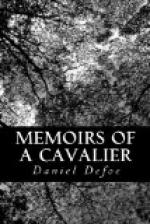The prodigious collection of matter which this swelling discharged gave me immediate relief, and I became sensible in less than an hour’s time; and in two hours or thereabouts fell into a little slumber which recovered my spirits and sensibly revived me. Here I lay by it till the middle of September. My captain fell sick after me, but recovered quickly. His man had the plague, and died in two days; my man held it out well.
About the middle of September we heard of a truce concluded between all parties, and being unwilling to winter at Villa Franca, I got passes, and though we were both but weak, we began to travel in litters for Milan.
And here I experienced the truth of an old English proverb, that standers-by see more than the gamesters.
The French, Savoyards, and Spaniards made this peace or truce all for separate and several grounds, and every one were mistaken.
The French yielded to it because they had given over the relief of Casale, and were very much afraid it would fall into the hands of the Marquis Spinola. The Savoyards yielded to it because they were afraid the French would winter in Piedmont; the Spaniards yielded to it because the Duke of Savoy being dead, and the Count de Colalto, the Imperial general, giving no assistance, and his army weakened by sickness and the fatigues of the siege, he foresaw he should never take the town, and wanted but to come off with honour.
The French were mistaken, because really Spinola was so weak that had they marched on into Montferrat the Spaniards must have raised the siege; the Duke of Savoy was mistaken, because the plague had so weakened the French that they durst not have stayed to winter in Piedmont; and Spinola was mistaken, for though he was very slow, if he had stayed before the town one fortnight longer, Thoiras the governor must have surrendered, being brought to the last extremity.
Of all these mistakes the French had the advantage, for Casale, was relieved, the army had time to be recruited, and the French had the best of it by an early campaign.
I passed through Montferrat in my way to Milan just as the truce was declared, and saw the miserable remains of the Spanish army, who by sickness, fatigue, hard duty, the sallies of the garrison and such like consequences, were reduced to less than 2000 men, and of them above 1000 lay wounded and sick in the camp.
Here were several regiments which I saw drawn out to their arms that could not make up above seventy or eighty men, officers and all, and those half starved with hunger, almost naked, and in a lamentable condition. From thence I went into the town, and there things were still in a worse condition, the houses beaten down, the walls and works ruined, the garrison, by continual duty, reduced from 4500 men to less than 800, without clothes, money, or provisions, the brave governor weak with continual fatigue, and the whole face of things in a miserable case.




